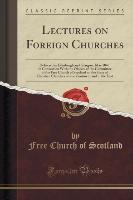Lectures on Foreign Churches
BücherAngebote / Angebote:
Excerpt from Lectures on Foreign Churches: Delivered in Edinburgh and Glasgow, May 1845, in Connection With the Objects of the Committee of the Free Church of Scotland on the State of Christian Churches on the Continent and in the East
In the first place, it is to be altogether divested of the local and territorial character which belonged to the pre ceding dispensation, as well as Of the cumbrous mass of ritual and ceremonial Observances to which the Jewish church was bound. There is to be no holy city or venerable temple on earth, to which the tribes of the Lord must go up, there is to be no priestly order or transmitted virtue of priestly consecration, nor is any set of minute and rigid regulations, as to the worship and service of God, to be enforced by statute, or pre scribed as the condition of acceptance. Under the Old Testament economy, the people were to dwell alone and accessions from other nations could be made by proselytism, only on the terms of exact conformity to a strict, specified, and unalterable routine, implying a con nection of locality with one favoured Spot, and a concur rence in one precise and peremptory directory. The gospel threw matters much more open as to all that concerns the place, the agents, and the manner of wor ship, religion ceased to be local, personal, and ceremo nial, the truth to be received was most exactly and carefully defined, but, evidently Of set purpose, no rules were given for settling in detail the questions of, where? And how? Or the localities and methods Of divine service, pains were taken to have men's minds duly informed, and men's hearts made right with God, but, as to the rest, latitude was allowed for carrying out, in practice, the general principles Of evangelical faith and love.
But farther, secondly, as to rule or government, one thing, at least, is plain, that under the new economy, no universal empire or monarchy was established, certainly not in the beginning Of the Christian dispensation, was any such universal subjection to one authority contemplated, or any provision made for it. On the contrary, the temple service, and the whole priestly hierarchy connected with it, being for ever set aside, the model or platform of the Christian discipline and administration, was undeniably the usage of the synagogues, and beyond all question, that system savoured far more Of the principle of repub lican self-regulation each society with its own officers, exercising a large discretion in the regulation of its own services and the management of its own affairs than of any general and uniform submission to one order or to one head. It would appear, indeed, that in cities and populous neighbourhoods, there was more of a community of the pastors and elders of different congregations, as well as of the congregations themselves, than the ancient cus tom of the synagogue, or, perhaps, the modern rule of in dependency based upon it, exemplifies and realises and there are reasons for believing that local ties contributed to consolidate the believing inhabitants of a town, a pro vince, and a country, into one compact body, and that this formed a part of the original apostolic plan. Still, whether on a smaller or a larger scale, the principle which developed itself in the early church, and which is, at least by implication and in embryo, contained in the New Testament, is substantially that of self-government, fitted to give the church the aspect of a number of free and separate commonwealths, rather than that Of one single, vast, and gigantic empire.
About the Publisher
Forgotten Books publishes hundreds of thousands of rare and classic books. Find more at www.forgottenbooks.com
Folgt in ca. 5 Arbeitstagen

